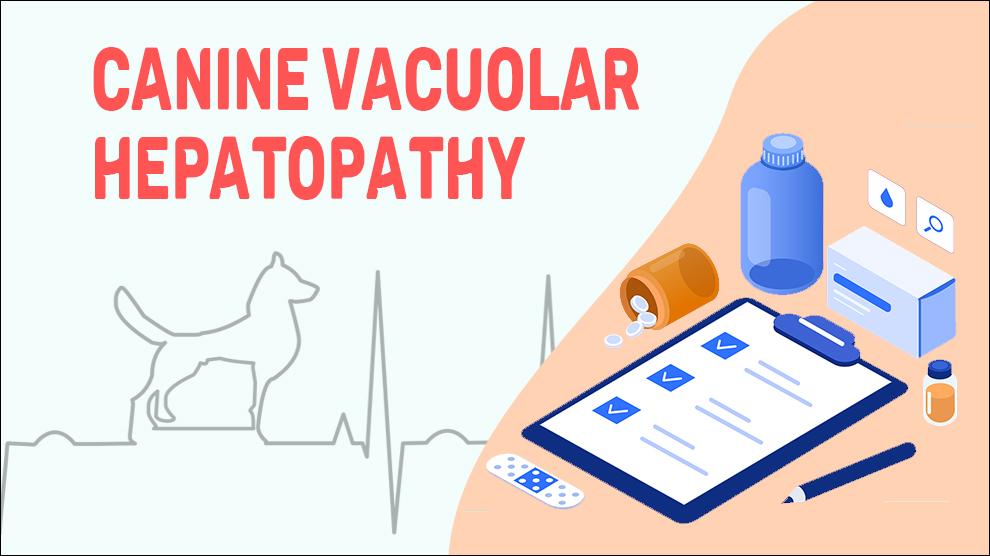What is Canine Vacuolar Hepatopathy In Dogs?
Canine vacuolar hepatopathy is the development of benign, congenital fluid-filled or the solid mass of cells called vacuoles in the hepatocytes of the liver in dogs. When the liver cells are strained or damaged, one of their responses is to puff up and develop vacuoles. They are most often filled with a stored form of glucose called glycogen, fat (lipids) or water, or waste products.
Usually, they are asymptomatic - cause no signs or symptoms, they are identified when the liver starts to behave abnormally. Sometimes, they may be large enough to hamper the function of the liver or interfere with bile flow or they can also be a part of underlying liver diseases.
Vacuolar hepatopathy is overrepresented in certain breeds of dogs due to either a predisposition to developing high levels of cholesterols triglycerides (hyperlipidemia) or hyperadrenocorticism (Cushing’s disease).
Vacuoles of the liver can crop up at any time during a dog’s life and the list of possible causes for vacuolar formation is quite extensive.
Symptoms Of Canine Vacuolar Hepatopathy In Dogs
- Protruding or distended stomach
- Bloating or abdominal pain
- Feelings of abdominal fullness
- Lethargy
- Nausea and vomiting
- Excessive thirst/urination
Treatment Options For Canine Vacuolar Hepatopathy In Dogs
Treatment is not necessary for most liver vacuoles. However, rarely do vacuoles get large and cause discomfort or other symptoms, then they will be drained or surgically removed.
- Close monitoring is required for any underlying causes (Cushing’s disease).
- If steroid medication is the cause of the disorder, then cessation of the drugs is enough for the reversal of the disorder.
- Intravenous fluid and nutritional therapy will be given to help your dog not become severely dehydrated.
- Immunosuppressive or anti-inflammatory medications.
- Anti-diarrhea medications.
Home Remedies For Canine Vacuolar Hepatopathy In Dogs
Follow the instructions given to you by your veterinarian for the entire recommended time period. No matter how badly you want relief for your dogs or what you hear from other dog owners, talk with your vet before trying any home remedy.
Make sure to provide plenty of drinking water.
If any specific diet has been suggested to your dog, follow the diet very strictly, and never provide or allow others to give your dog treats or other food.
How to Prevent Canine Vacuolar Hepatopathy In Dogs?
Liver vacuole's etiology is poorly understood. Specific causes are not yet known. However, Hereditary is, perhaps a factor in some breeds and it is better to evaluate the affected dogs before breeding or at least before getting a dog from a susceptible lineage and get the health checks done.
Affected Dog Breeds Of Canine Vacuolar Hepatopathy
Breeds prone to Cushing’s disease:
Australian Shepherd, Beagle, Boxer, Boston Terrier, Cocker Spaniel, Dachshund, Jack Russell Terrier, Poodle, Maltese, Staffordshire Terrier, Scottish Terrier, Yorkshire Terrier.
Breeds affected by hyperlipidemia:
Beagle, Brittany Spaniel, Great Pyrenees, Briard, Collie, Doberman Pinscher, Miniature Schnauzer, Rough Collie, Rottweiler, Shetland Sheepdog.
Additional Facts For Canine Vacuolar Hepatopathy In Dogs
- Causes:
- Hereditary: Due to either hyperlipidemia and/or hyperadrenocorticism.
- Adrenal abnormalities - An impaired function of the adrenal glands and elevated production levels of progesterone.
- Primary Hyperlipidemia
- Hepatitis or other liver diseases in dogs.
- Chronic use of steroid medications.
- Immune-mediated diseases (such as Inflammatory bowel disease, and immune-mediated hemolytic anemia).
- Neurologic conditions (including Intervertebral Disc Disease or degenerative myelopathy in dogs).
- Types:
Canine vacuolar hepatopathy may be congenital or acquired.
- Congenital Vacuolar Hepatopathy: This is a hereditary anomaly in the liver and affected dogs are born with cysts.
- Acquired Vacuolar Hepatopathy: This is a result of infections, trauma, and exposure to toxins, and harmful chemicals.
- Morbidity:
Liver Vacuoles are usually benign, which means they are non-cancerous. Occasionally, they can grow or multiply large enough to affect the liver function.
- Mortality:
There is no documented mortality due to this condition.
- Diagnosis:
- Ultrasound
- MRI
- CT scan
- Blood tests to determine parasitic infection
- Prognosis:
The prognosis for Liver vacuoles is really good. As the existing condition is not life-threatening, no rigorous treatment is usually necessary. However, relapse is possible following medical treatment in affected dogs.
When To See A Vet For Canine Vacuolar Hepatopathy In Dogs?
It’s better to set up an appointment with your veterinarian if you notice:
- Protruding or distended stomach.
- Continuous pain in the upper-right part of the stomach.
Dog Food Suggestions For Canine Vacuolar Hepatopathy
Nutrient-dense, vitamin-rich fruits and veggies:
- Legumes, such as lentils, peas, or beans
- Cauliflower, Cabbage, Broccoli
- Spinach, Kale
- Tomatoes
- Citrus, such as oranges and limes
- Avocadoes, Blueberries, Blackberries, Raspberries
High-fiber foods:
- Whole grain bread, rice, and cereal
- Green beans, Peas
- Psyllium Husk
- Beet Pulp
- Flaxseed
Conclusion
Dogs that have been diagnosed with canine vacuolar hepatopathy should be closely monitored for liver functionality to ensure prompt treatment for any changes.
The prognosis for vacuolar hepatopathy is unpredictable and is based mostly on the underlying cause.
Most of the dogs with this disorder never show any outward symptoms of vacuolar hepatopathy but may continue to have an unimpeded liver function, but others may develop hepatocellular carcinoma or progressive dysfunction of the liver.

















